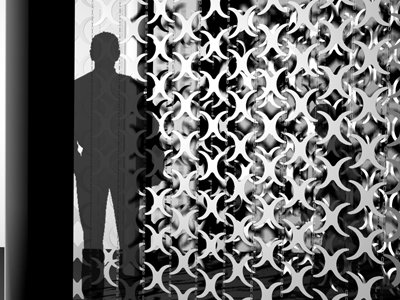H-edge
dal 13/9/2006 al 27/10/2006
Segnalato da
13/9/2006
H-edge
Artist Space, New York
Anew project created by Cecil Balmond and Arup Advanced Geometry Unit, a think tank dedicated to researching complex structural geometry in support of new architectural visions and solutions.

This fall, Artists Space presents h-edge, a new project created by Cecil Balmond and
ARUP Advanced Geometry Unit, a think tank dedicated to researching complex
structural geometry in support of new architectural visions and solutions. AGU’s
installation at Artists Space will function as an enclosure within the gallery,
allowing visitors the opportunity to experience, interact with, and compartmentalize
physical space in new and exciting ways. h-edge is an experiment in the use of
geometry and matter to create organizations of space. h-edge traverses the
boundaries of mathematics, art, architecture and engineering, exploring new
opportunities of complexity.
The project exists on three levels: the mathematical-geometric, the
architectural-spatial and the structural-tectonic. h-edge is based on a cubic
fractal tiling of space known as the Menger Sponge. The geometric matrix of this
sponge is modular and self-similar offering positive and negative space at embedded
scales. This binary tiling is deployed at three different scales, which create
spatial conditions that relate to the scale of the human body. These are named
cave, trench, and path
.
Tectonically, the tiling is achieved through the use of two modular units: the leaf
and the chain-link, which interlock to form a suspended network of reciprocal
load-paths. The staggering of the plates along the chain in four directions ensures
that no plate touches another and that the chain is pre-stressed to form a rigid
load-path. h-edge and the Fourier Carpet are binary systems describable as ordered
series of 0 and 1 digits in three- and two-dimensional mathematical space. They both
demonstrate how number systems can be used to describe, control and inform geometric
complexity.
h-edge has been designed by the ARUP Advanced Geometry Unit in London, and
constructed in Philadelphia with the help of Penn Design students. It consists of
5200 laser-cut aluminum plates and almost 5000ft of stainless steel chain. The
Fourier Carpet has been digitally generated and designed by Jenny E. Sabin in
Philadelphia and woven on a digitized Jacquard Loom by Keystone Weaving in Lebanon,
Pennsylvania. It is 36ft by 5ft and is composed of interlaced black and white wool
threads.
Design Team: Cecil Balmond, Charles Walker, Francis Archer, Daniel Bosia, Jenny E.
Sabin
Assembly Team: Jenny E. Sabin and PennDesign Students
Curated by Christian Rattemeyer
h-edge is supported, in part, by ARUP, the Graham Foundation for Advanced Studies in
the Fine Arts, Elise Jaffe + Jeffrey Brown, and PennDesign.
Opening Reception: September 14, 6-8PM
Artist Space
38 Greene Street, 3rd Floor - New York



